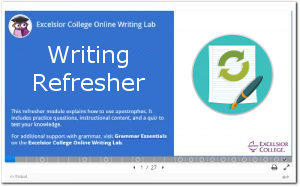 You want to be sure that you are always consistent with your verb tense. When you shift verb tenses for no reason, and this is an easy mistake to make, you can really confuse your readers.
You want to be sure that you are always consistent with your verb tense. When you shift verb tenses for no reason, and this is an easy mistake to make, you can really confuse your readers.
Si usted'está escribiendo en tiempo presente, asegúrese de que usted permanezca en tiempo presente. Si usted'está escribiendo en tiempo pasado, asegúrese de que usted permanezca en tiempo pasado. La excepción sería si usted necesita cambiar de tiempo para contar una historia, pero eso sería un cambio intencionado. Son los cambios aleatorios y accidentales los que causan problemas, como se ilustra en este ejemplo:
These sentences begin in the past tense, then switch to the present tense. Here is what a corrected version of the sentence looks like:
You should also be aware that certain types of writing require either past or present tense—or both. For example, research in APA format often needs to be presented in the past tense, but a literary analysis written in MLA format needs to be presented using present tense verbs. It’s called the literary present tense. Generally speaking, no matter what style guide you are following, you want to write about authors, poets, and playwrights in the present tense. For example:
Because literature is seen as a living art form, we use the present tense to describe what writers do.
Below is a table of APA 7th edition verb tense recommendations for literature reviews and research papers.
Si usted'alguna vez no está seguro de los requisitos de tensión, asegúrese de preguntar a su profesor.
| Sección de papel | Tensión recomendada | Ejemplo |
| Revisión de la literatura (o siempre que se discuta el trabajo de otros investigadores) | Pasado | Quinn (2020) presentó |
| Presente perfecto | Desde entonces, muchos investigadores han utilizado | |
| Método o descripción del procedimiento | Pasado | Los participantes completaron una encuesta |
| Presente perfecto | Otros han utilizado enfoques similares | |
| Comunicación de los resultados | Pasado | Los resultados no fueron significativos Las puntuaciones aumentaron Se apoyaron las hipótesis |
| Discusión de las implicaciones de los resultados | Presente | Los resultados indican |
| Presentación de conclusiones, limitaciones, direcciones futuras, etc. | Presente | Concluimos Las limitaciones del estudio son |



